UNESCO AND THE ISSUE OF CULTURAL DIVERSITY Review ... - ITI
UNESCO AND THE ISSUE OF CULTURAL DIVERSITY Review ... - ITI
UNESCO AND THE ISSUE OF CULTURAL DIVERSITY Review ... - ITI
You also want an ePaper? Increase the reach of your titles
YUMPU automatically turns print PDFs into web optimized ePapers that Google loves.
epresenting preconditions for and products of this cultural affirmation,<br />
creating a virtuous circle of cultural and economic flourishing. As had been<br />
noted early on in <strong>UNESCO</strong>% history, if not at the very beginning, culture was<br />
not just a channel for expression: it was itself constitutive of a people as a<br />
political actor on the international stage.<br />
l Sub-Obiective 1.2.4 : Promotion of respect for the cultural identitv of<br />
individuals and qroups, with particular reference to those affected bv the<br />
social exclusion phenomenon within developed or developina societies.<br />
This raises the issue of intra-societal cultural identities, and the question<br />
of social cohesion within states themselves, a question that would take on<br />
greater importance in the next decade. While the situation of migrant<br />
workers had already been studied in this context, a growing realization at<br />
this time that state populations were in fact more diverse than had<br />
sometimes been admitted opened up a whole new series of questions<br />
and priorities. Especially in urban centers, the discourse of<br />
marginalization involves both socio-economic and cultural factors, which<br />
are themselves often related. This objective evokes the central idea of<br />
pluralism as participation and sharing, not retreat or reclusion, as well as<br />
the notion of intercultural dialogue-ideas but are just as important within<br />
multicultural societies as they are between member states of the<br />
Organization.<br />
The question of how to encourage identity-affirmation while preventing<br />
divisiveness or reclusion was illustrated in the 28 November 1978 General<br />
Conference Resolution 4101 on Culture and Communication, which put forth<br />
the threefold goals of ‘fulfilment-development-solidarity’, hoping that these<br />
could reinforce rather than work against each other. Earlier that year, at the<br />
Bogota Intergovernmental Conference on Cultural policies in Latin America<br />
and the Caribbean, it had been concluded that ‘there cari be no cultural<br />
policy without an appropriate cultural policy’ (p. 3). The Conference was held<br />
from 10-20 January, and the Director-General issued his Report on the<br />
conference on 28 July (from which these citations are drawn). The major<br />
themes of the conference were cultural identity, cultural development, and<br />
cultural co-operation. The fourth in a series of regional intergovernmental<br />
conferences on the issue of cultural policies, this particular conference saw<br />
‘A remarkable convergence in attitude to the basic problems under<br />
consideration’; indeed, the Director-General reported that ‘The Conference.. .<br />
marked a turning point for <strong>UNESCO</strong> in cultural co-operation’ (p. 1). The idea<br />
that cultural pluralism could be ‘the very essence of cultural identity’<br />
challenged the picture of culturally monolithic states and introduced the<br />
notion, familiar in the Caribbean, of a ‘culture de métissage’. Given this<br />
tremendous diversity, the conclusion was reached that ‘...cultural diversity of<br />
peoples should be regarded as a stabilizing rather than a divisive factor’.<br />
Taking advantage of this potential would ‘impels people to regain control<br />
over their own destiny, while strengthening their interest in the outside world’<br />
(p. 1). Empowerment would lead to exchanges, not exclusions.<br />
The by now well-established idea of culture as the very essence of a<br />
people, and not just a product or a means, is clear in the Bogota Declaration:<br />
‘as the sum total of the values and creations of a society and the expression of<br />
13



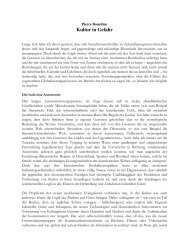
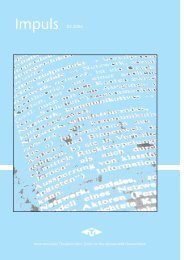
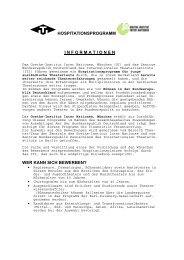
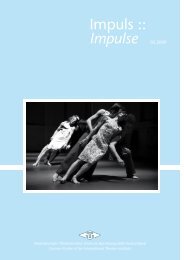
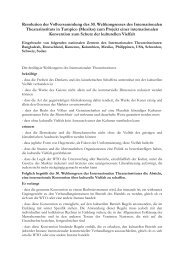
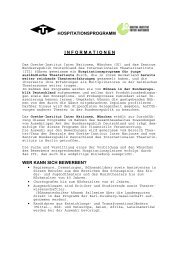
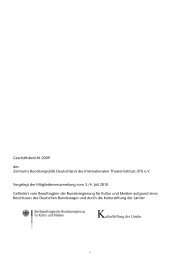
![Geschäftsbericht 2010 [pdf 2 MB] - ITI](https://img.yumpu.com/4380475/1/184x260/geschaftsbericht-2010-pdf-2-mb-iti.jpg?quality=85)